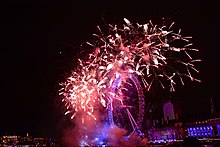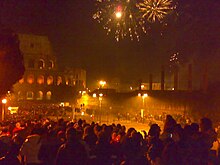
Back Nuwejaarsdag Afrikaans رأس السنة الميلادية Arabic راس السنه الميلاديه ARZ Yeni il günü Azerbaijani Aldaw kan Bagong Taon BCL न्यू इयर Bihari নববর্ষ (গ্রেগরীয় বর্ষপঞ্জি) Bengali/Bangla གནམ་ལོ་གསར་ཚེས། Tibetan Dia de Nuevo Año CBK-ZAM Adlaw sa Bag-ong Tuig CEB
| New Year's Day | |
|---|---|
 Fireworks in Mexico City for the Celebration of the New Year in 2013 | |
| Observed by | Users of the Gregorian calendar |
| Type | International |
| Significance | The first day of the year in the Gregorian calendar |
| Celebrations | Making New Year's resolutions, church services, parades, parties, sporting events, fireworks,[1] drone light shows |
| Date | 1 January |
| Next time | 1 January 2026 |
| Frequency | Annual |
| Related to | |
In the Gregorian calendar, New Year's Day is the first day of the calendar year, 1 January. Most solar calendars, such as the Gregorian and Julian calendars, begin the year regularly at or near the northern winter solstice. In contrast, cultures and religions that observe a lunisolar or lunar calendar celebrate their Lunar New Year at varying points relative to the solar year.
In pre-Christian Rome, under the Julian calendar, the day was dedicated to Janus, god of gateways and beginnings, for whom January is also named. From Roman times until the mid-18th century, the new year was celebrated at various stages and in various parts of Christian Europe on 25 December, on 1 March, on 25 March and on the movable feast of Easter.[2][3][4]
In the present day, with most countries now using the Gregorian calendar as their civil calendar, 1 January according to Gregorian calendar is among the most celebrated of public holidays in the world, often observed with fireworks at the stroke of midnight following New Year's Eve as the new year starts in each time zone. Other global New Year's Day traditions include making New Year's resolutions and calling one's friends and family.[1]


- ^ a b Mehra, Komal (2006). Festivals Of The World. Sterling Publishers. p. 69. ISBN 978-1-8455-7574-8.
In many European countries like Italy, Portugal and Netherlands, families start the new year by attending church services and then calling on friends and relatives. Italian children receive gifts or money on New Year's Day. People in the United States go to church, give parties and enjoy other forms of entertainment.
- ^ "New Year's Day: Julian and Gregorian Calendars". Sizes.com. 8 May 2004. Archived from the original on 5 April 2016. Retrieved 7 January 2021.
- ^ Poole, Reginald L. (1921). The Beginning of the Year in the Middle Ages. Proceedings of the British Academy. Vol. X. London: British Academy. Archived from the original on 23 November 2021. Retrieved 24 November 2021 – via Hathi Trust.
- ^ Bond, John James (1875). Handy Book of Rules and Tables for Verifying Dates With the Christian Era Giving an Account of the Chief Eras and Systems Used by Various Nations...'. London: George Bell & Sons. p. 91.